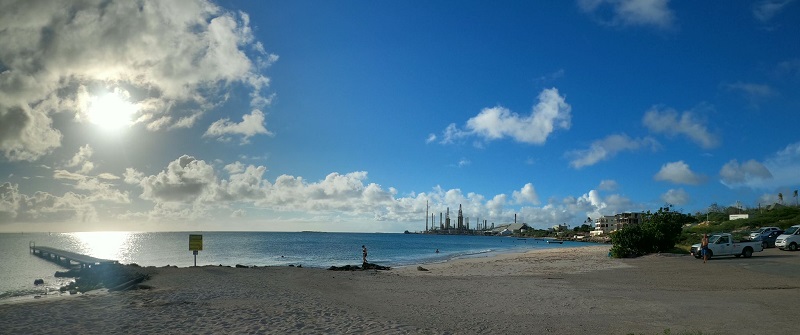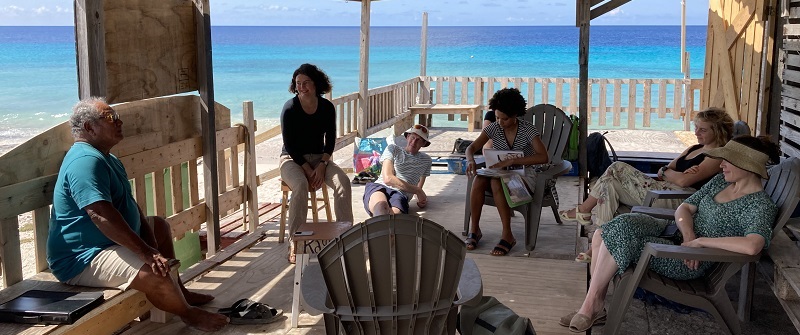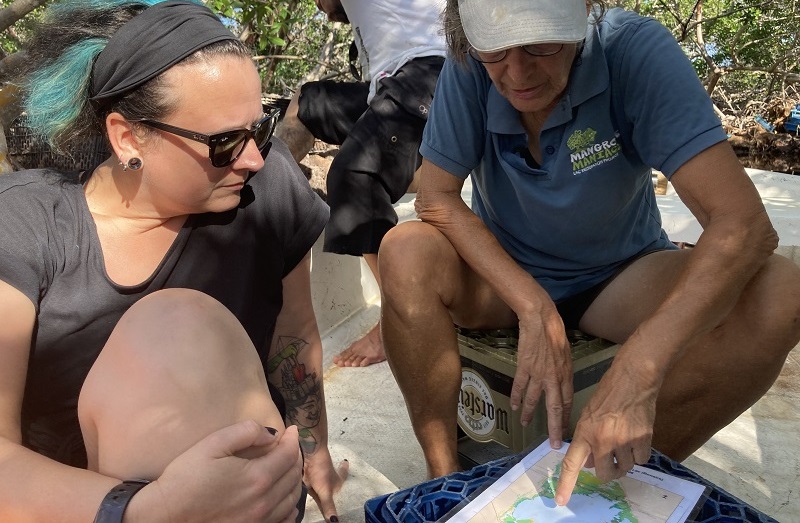
14 Feb Blog: Breaking out of the virtual: Diving into Marine Protected Area governance in the Dutch Caribbean
By Yvonne Kunz.
Tropical coasts are being faced by unprecedented sustainability challenges, with climate change posing immediate threats, including sea level rise and increasing storm frequency and intensity. Understanding the consequences of climate change and how to adapt governance approaches in response to it requires a knowledge of the ecological and political context, of the stakeholders involved and of the power dynamics at play. To dive into these topics, an interdisciplinary team of researchers, led by KITLV, embarked on a field trip to Curaçao, Bonaire and Aruba.
In April 2021, KITLV initiated the virtual kick-off to a pilot project on Marine Protected Area Governance in a changing climate. The coordinating team for the project, made up of David Kloos, Yvonne Kunz and Sikko Visscher (all from KITLV), Lisa Becking (Marine Biologist, Wageningen University & Research) and Liesbeth Bakker (Ecologist, Netherlands Institute of Ecology), was fortunate to embark on a first physical field trip in November.
The team’s intention was to become acquainted with the Marine Protected Areas on Bonaire and Aruba (the field sites the project partners had worked together to identify in virtual workshops) and their trip was packed with exciting networking meetings. Marine Protected Areas (MPA) as the research unit were initially designed to conserve nature and related ecosystem services. Performing this task is becoming increasingly challenging due to the consequences of climate change, which do not stop at MPA borders.

The field trip got off to a brilliant start as one project member, the Dutch Caribbean Nature Alliance (DCNA), had invited the research team to a DCNA board meeting on Curaçao. The DCNA’s mission is to safeguard nature by supporting Protected Area Management Organizations. The board meeting attended by the team provided an opportunity to engage with Protected Area Management representatives, which included Marine Park Managers from six Dutch Caribbean islands, and therefore with people experiencing and monitoring impacts at first hand.
On Bonaire and Aruba, the actual study sites, the team encountered parrot fish, donkeys and goats, mangroves (and Mangrove Maniacs) and turtles. They were also introduced to people involved and interested in preserving the parrot fish and reducing the impact that roaming donkeys and goats have on land vegetation cover. Limited vegetation leads to erosion, while an increase promotes sedimentation into the mangroves and the sea. Mangroves (along with sea meadows and beaches) are important to species including turtles and parrot fish, but sedimentation processes are putting them under threat.
The main stakeholders engaged in protecting these parts of the ecosystem are the Protected Area Management Organizations. At the same time, an intriguing group and impressive number of people outside the formalized conservation parks are dedicating massive amounts of time and energy to keeping the system healthy. Donkeys and goats are not the only ones presenting a challenge to the terrestrial system: land developments linked to the tourism industry pose another and these are very probably a much bigger stressor. In the Dutch Caribbean, tourism is not limited to the land. Gigantic cruise ships and their impact on the land and in the water also took up research time on both Bonaire and Aruba.

Meeting and discussing climate change impacts with stakeholders representing nature conservation, the tourism sector, local government, fisheries and the media on this trip turned out to be even more exciting as the information was taken up from the various disciplinary backgrounds the team carried in their luggage. It was the first time the team had conducted field work together and it was encouraging to see how well the disciplinary perspectives fitted together, like the pieces of a puzzle. Open and respectful communication within the team allowed these puzzle pieces to fall into place. The process of finding a shared language increased a sense of project co-ownership and the joy of investigating a problem from various perspectives.
Climate change remained a marginal topic in the discussions on this first trip. Stakeholders see the urgent need to integrate adaptation measures but are kept busy with other struggles that appear more immediate. Challenges preoccupying nature conservation actors are, for example, sediment influx as a consequence of limited land vegetation cover, heavy tourist infrastructure development and the non-recognition of protected areas by local resource users. Limited financial and time capacities was another challenge mentioned. At the same time, there is a great readiness to discuss the topic of climate change, as plans for how to deal with it once the resources become available are still not fully developed. Generating scientific knowledge can be one way of supporting this process.
Aiming at an inter-regional (Bonaire and Aruba) as well as a cross-regional (Dutch Caribbean and Indonesia) comparison to generate knowledge on impacts and responses, the team hopes to break out from the virtual world again soon, carrying their snorkelling gear to their next research adventure in Indonesia.

Yvonne Kunz is a human geographer and a post-doctoral researcher at KITLV. For the project ‘Climate change and governance in Indonesia and the Caribbean: A pilot project on Marine Protected Areas’, she investigates whether marine protected areas as a governance tool are capable of keeping pace with climate change as an additional stressor to socio-ecological systems.
Photos by David Kloos.




No Comments